For
Joshua
For
Joshua
An Ojibwe Father Teaches His Son
Richard Wagamese
MILKWEED EDITIONS
2002, Text by Richard Wagamese
First published by Doubleday Canada, 2002.
All rights reserved. Except for brief quotations in critical articles or reviews, no part of this book may be reproduced in any manner without prior written permission from the publisher: Milkweed Editions, 1011 Washington Avenue South, Suite 300, Minneapolis, Minnesota 55415.
(800) 520-6455
milkweed.org
Published 2020 by Milkweed Editions
Printed in Canada
Cover design by Mary Austin Speaker
Cover photograph by Brad Wilson
Author photo by Linda McRae
20 21 22 23 245 4 3 2 1
First US Edition
Milkweed Editions, an independent nonprofit publisher, gratefully acknowledges sustaining support from the Alan B. Slifka Foundation and its president, Riva Ariella Ritvo-Slifka; the Ballard Spahr Foundation; Copper Nickel; the Jerome Foundation; the McKnight Foundation; the National Endowment for the Arts; the National Poetry Series; the Target Foundation; and other generous contributions from foundations, corporations, and individuals. Also, this activity is made possible by the voters of Minnesota through a Minnesota State Arts Board Operating Support grant, thanks to a legislative appropriation from the arts and cultural heritage fund. For a full listing of Milkweed Editions supporters, please visit milkweed.org.
Library of Congress Cataloging-in-Publication Data
Names: Wagamese, Richard, author.
Title: For Joshua : an Ojibwe father teaches his son / Richard Wagamese.
Description: First US edition. | Minneapolis, Minnesota : Milkweed Editions, 2020. | Series: Seedbank | "First published by Doubleday Canada, 2002." | Summary: "Richard Wagamese's For Joshua is at once a deeply personal memoir, a search for peace amidst the chaos of human life, and an extended love letter to Wagamese's estranged son"--Provided by publisher.
Identifiers: LCCN 2019036387 (print) | LCCN 2019036388 (ebook) | ISBN 9781571313898 (trade paperback) | ISBN 9781571317339 (ebook)
Subjects: LCSH: Wagamese, Richard. | Authors, Canadian--20th century--Biography. | Indian authors--Canada--Biography. | Ojibwa Indians--Biography. | Fathers and sons--Canada.
Classification: LCC PR9199.3.W316 Z466 2020(print) | LCC PR9199.3.W316 (ebook) | DDC 813/.54 [B]--dc23
LC record available at https://lccn.loc.gov/2019036387
LC ebook record available at https://lccn.loc.gov/2019036388
Milkweed Editions is committed to ecological stewardship. We strive to align our book production practices with this principle, and to reduce the impact of our operations in the environment. We are a member of the Green Press Initiative, a nonprofit coalition of publishers, manufacturers, and authors working to protect the worlds endangered forests and conserve natural resources. For Joshua was printed on acid-free 100% post-consumer-waste paper by Friesens Corporation.
CONTENTS
AUTHORS NOTE
I was created to be Anishanabe-niiniIndian Man. Thus, I was born Ojibwe I emerged onto Mother Earth as a human being gifted with this identitymale Ojibwe human being. Since 1955, learning to be who I was created to be has been my journey, my trial, my ongoing process of creation.
This thing we call Native, Indian, First Nations, Aboriginal, Indigenous, or Original Peoples cannot be found in any one place. It is a cosmology, a belief, a way of being, unconstrained by geography, politics or even time itself. It is too immense to be contained in one simple definition. Only with the utmost simplification can one say, This is what it means to be Indian.
The lives of Native people in Canada are ones of endless toil, frustration and heartache. This they have borne with great good humour, grace, and dignity. To say that I am one of them is my greatest pride.
But I am only oneand this is but the story of one Native life, as experienced against the flux and flow of Canada over forty-six years. If it teaches, that is grace. If it evokes empathy, that is blessing. Should it enable one person, Native or not, to step forward towards who they were created to be, that would be reward enough for one Native life.
R.W.
For
Joshua
FOR JOSHUA
Once there was a lonely little boy. He had no idea where he belonged in the world. The boy had no knowledge about where his family was or where hed come from. So he began to dream. He imagined a glorious life with a mother and father, sisters and brothers, grandfathers and grandmothers. He put his dreams down on paper and filled the pages with drawings, stories, poems, and songs of the people he missed so much but could not remember. But he always awoke, the stories and poems always ended, and the songs faded off into the night.
As he grew, the boy carried this emptiness around inside him. Everywhere he went, it was his constant companion. Many people took turns caring for the boy, and many people tried to fill that hole, but no one ever could. Through all the homes he drifted the boy began to realize that all that ever really changed about him were his clothes.
One day, the people around him said that he was old enough to go and find there. It was a magical place, this place called there, because everyone got to choose where there would be for them.
But finding there was difficult. The boy took many roads, many turns, many long lonely journeys trying to find it. He grew older. He lived in many places and with many different people. But inside himself he was still a lonely little boy who could only ever dream dreams, create stories and poems and songs about the kingdom of there.
Then one day he met a kind, gentle old man on one of the twisted, narrow roads he was travelling. This old man had been everywhere and seen many things. He was wise and liked the young man very much. As they sat together by the side of that long, narrow road, the old man began to tell him stories about all of his travels, and especially about how good it felt to return from those journeys.
What is return? the young man asked.
Why, its to get back to where you started, where you belong, the old man said.
What does it mean to belong?
The old man smiled kindly and said, To belong is to feel right. Its a place where everything fits.
How do you get there? the young man asked.
Well, getting anywhere means you have to make a journey. But on this journey, to find where you belong, you really only have to travel one direction, the old man said.
What direction is that?
The toughest direction of all, the old man said. You have to travel inside yourself, not down long, narrow roads like this one.
Does it hurt? the young man asked.
Sometimes. But anyone who makes that journey finds out that no matter how hard the journey is, getting there is the biggest comfort of all.
The young man thought about the old mans words. They were mysterious and strange. In fact, they werent answers to his questions at all, just more and more questions lined up one behind the other as far as he allowed his mind to wander. But there was something in the gentle way the old man had of talking that made him feel safea trust that everything he said was true. Even if he couldnt understand it all.












